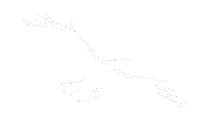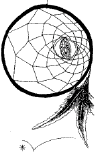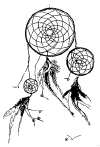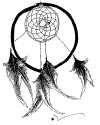His friend and brother Wa-wa-tam was not slow in exerting
himself for his preservation, and leaving Mackinaw during the night, he
proceeded with him to Isle aux Outardes, on the route to Sault Sainte Marie.
Here Nonen, the wife of Wa-wa-tam, falling sick, they were obliged to remain
for some days, in the greatest fear of hostile Indians, who were now daily
expected to pass on the route to Missisaukie, or Straits of Niagara, for the
purpose of carrying on the war against the British. A return to Mackinaw was
to incur certain destruction, and it was with the greatest pleasure that the
distressed traveler at last saw a canoe approaching the island, which he
knew must be manned by Canadians, by the manner in which the paddles were
managed, and the whiteness of the sail. On entering the lodge of his adopted
brother, elated with the news of the approach of white men, he says:--
"The family congratulated me on the approach of so fair an
opportunity of escape, and my father and brother (for he was alternately
each of these) lit his pipe, and presented it to me, saying, 'my son, this
may be the last time that ever you and I shall smoke out of the same pipe. I
am sorry to part with you. You know the affection which I have always borne
you, and the dangers to which I have exposed myself and family, to preserve
you from your enemies; and I am happy to find that my efforts promise not to
have been in vain.' At this time a boy came into the lodge, informing us
that the canoe had come from Michilimackinac, and was bound to the Sault de
Salute Marie. It was manned by three Canadians, and was carrying home Madame
Cadotte, the wife of M. Cadotte, already mentioned. My hopes of going to
Montreal being now dissipated, I resolved on accompanying Madame Cadotte,
with her permission, to the Sault. On communicating my wishes to Madame
Cadotte, she cheerfully acceded to them. Madame Cadotte, as I have already
mentioned, was an Indian woman of the Chippeway nation, and she was very
generally respected. ... Being now no longer in the society of Indians, I
put aside their dress, putting on that of a Canadian: a moleton or blanket
coat over my shirt, and a handkerchief about my head, hats being very little
worn in this country. At daylight on the second morning of our voyage, we
embarked, and presently perceived several canoes behind us. As they
approached, we ascertained them to be the fleet bound for the Missisaki, of
which I had been so long in dread. It amounted to twenty sail.
"On coming up with us, and surrounding our canoe, and amid
general inquiries concerning the news, an Indian challenged me for an
Englishman, and his companions supported him, saying that I looked very like
one, but I affected not to understand any of the questions which they asked
me; and Madame Cadotte assured them that I was a Canadian, whom she had
brought on his first voyage from Montreal. The following day saw us safely
landed at the Sault, where I experienced a generous welcome from M. Cadotte.
There were thirty warriors at this place, restrained from joining the war
only by M. Cadotte's influence.
Here, for five days, I was once more in possession of
tranquility; but on the sixth, a young Indian came into M. Cadotte's, saying
that a canoe full of warriors had just arrived from Michilimackinac; that
they had inquired for me; and that he believed their intentions to be bad.
Nearly at the same time, a message came from the good chief of the village,
desiring me to conceal myself, until he should discover the views and temper
of the strangers. A garret was the second time my place of refuge; and it
was not long before the Indians came to M. Cadotte's. My friend immediately
informed Match-i-ki-wish, their chief, who was related to his wife, of the
design imputed to them, of mischief against myself. Match-i-ki-wish frankly
acknowledged that they had had such a design; but added, that if displeasing
to M. Cadotte, it should be abandoned. He then further stated, that their
errand was to raise a party of warriors to return with them to Detroit; and
that it had been their intention to take me with them.
"In regard to the principal of the two objects thus
disclosed, M. Cadotte proceeded to assemble all the chiefs and warriors of
the village, and then, after deliberating for some time among themselves,
sent for the strangers, to whom both M. Cadotte and the chief of the village
addressed a speech. In these speeches, after recurring to the designs
confessed to have been entertained against myself, who was now declared to
be under the protection of all the chiefs, by whom any insult I might
sustain would be avenged, the ambassadors were peremptorily told that they
might go back as they came, none of the young men of this village being
foolish enough to join them.
"A moment after, a report was brought that a canoe had
just arrived from Niagara. As this was a place from which every one was
anxious to hear news, a message was sent to these fresh strangers,
requesting them to come to the council. The strangers came accordingly, and
being seated, a long silence ensued. At length, one of them, taking up a
belt of wampum, addressed himself thus to the assembly:--
'"My friends and brothers, I am come with this belt from
our great father, Sir William Johnson. He desired me to come to you as his
ambassador, and tell you that he is making a great feast at Fort Niagara:
that his kettles are all ready and his fires lit. He invites you to
partake of this feast, in common with your friends, the Six Nations, who
have all made peace with the English. He advises you to seize this
opportunity of doing the same, as you cannot otherwise fail of being
destroyed; for the English are on their march with a great army, which
will be joined by different nations of Indians. In a word, before the fall
of the leaf, they will be at Michilimackinac, and the Six Nations with
them.'"
The tenor of this speech greatly alarmed the Indians
throughout the Northwest, and those who fortunately had not imbrued their
bands too deeply in British blood, were glad to send delegates to the Great
Council at Niagara. Among the rest, the Sault Ste. Marie Ojibways sent
twenty deputies, with whom Mr. Henry, after one year of captivity and
trouble, returned once more to his friends. These deputies, though they went
in fear and trembling, were well received at the hands of Sir William
Johnson, and they now experienced the good consequences of having listened
to the advice of their trader.
During the summer of the same year, 1764, in which the
council was held at Niagara, where it is said that twenty-two different
tribes were represented, a British force of three thousand men under Gen.
Bradstreet proceeded up the lakes as far as Detroit. Under the command' of
this officer, Alexander Henry had a battalion of Indian allies, among whom
were" ninety-six Ojibways of Sault Ste. Mary," who, however, nearly all
deserted before the army reached Fort Erie.
On arrival of this large body of troops at Detroit, a
permanent peace was affected with all the northern tribes, including the
Ojibways. Pontiac, the head and heart of the bloody Indian war, which had
now come to an end, was not present at this treaty. His best allies, the
tribes of the northern lakes, had deserted him, and he thereafter confined
his exertions to the tribes of the Miamis, Shawanoes, and Illinois, towards
the south and west. He never overcame his animosity to the Saxon race, and
had he not suffered a premature death at the hands of an Indian of the
Kaskaskia tribe, he would again have fanned the flames of another sanguinary
war. His name and influence extended over all the Algic tribes, and their
regret for his loss is fully proved by the manner in which the Ojibways,
Pottawaudumies, Ottawas, and Osaugees revenged his death by total
extermination of the tribe to which belonged his assassin, and of the
Illinois, Cahokias, and Peorias, who rallied to their defence, but a few
families were saved from total annihilation.
For two years after the ending of Pontiac's war, the fear
of Indian hostility was still so great that the British traders dared not
extend their operations to the more remote villages of the Ojibways, and La
Pointe, during this time, was destitute of a resident trader. To remedy this
great evil, which the Indians, having become accustomed to the commodities
of the whites, felt acutely, Ma-mong-e-se-da, the war chief of this village,
with a party of his fellows, was deputed to go to Sir Wm. Johnson, to ask
that a trader might be sent to reside among them lie is said to have been
well received by their British father, who presented him with a broad wampum
belt of peace, and garget. The belt was composed of white and blue beads,
denoting purity and the clear blue sky, and this act settled the foundation
of a lasting good-will, and was the commencement of an active communication
between the British and Ojibways of Lake Superior.
A brief notice may not be considered amiss in this place,
of the chief Ma-mong-e-se-da, who acted in this important affair as the
representative of his tribe. His father was a member of the Reindeer Clan,
and Belonged to the northern division of the tribe. He moved from Grand
Portage on the north shore of Lake Superior when a young man, to the main
village of his tribe at Shaugha-waum-ik-ong. Becoming noted as an active and
successful hunter, and having distinguished himself at the battle of Point
Prescott, where the Ojibways destroyed so many of their enemies, he married
a woman of the La Pointe village, who had been the wife of a Dakota chief of
distinction during the late term of peace which the French traders had
brought about. The renewal of the war had obliged her to separate from her
Dakota husband, and two sons whom she had borne him, one of whom afterwards
became a celebrated chief, whose name, Webesha, has descended down in Dakota
and Ojibway traditions to the present times.
Ma-mong-e-se-da (Big Feet), was the offspring of his
mother's second marriage with the young hunter of the Reindeer Clan. He
became noted as he grew up to be a man, for the fearless manner in which he
hunted on the best hunting grounds of the Dakotas, on the lower waters of
the Chippeway River, and an incident worthy of note is related as having
happened to him during the course of one of his usual fall hunts. His camp
on this occasion consisted of several lodges of his own immediate relatives.
They had approached near the borders of the Dakota country, in the midland
district lying between the Mississippi and Lake Superior, when, one morning,
his camp was fired on by a party of Dakota warriors; At the second volley
one of his men being wounded, Ma-mong-e-se-da grasping his gun sallied out,
and pronouncing his name loudly in the Dakota tongue, he asked if Wabasha,
his brother, was among the assailants. The firing ceased immediately, and
after a short pause of silence, a tall figure ornamented with a wardress,
his head covered with eagle plumes, stepped forward from the ranks of the
Dakotas and presented his hand. It proved to be his half brother Wabasha,
and inviting him and his warriors into his lodge, Ma-mong-e-se-da
entertained them in the style of a chief.
This chieftain was noted also for the frequency of his
visits to Montreal and Quebec, and the great love he bore to the French
people, whose cause he warmly espoused against the British. He was at last
recognized as a chief, and received a medal and flag at the hands of the
French. He actively aided them in their wars with Great Britain, and on one
occasion he took a message from Gen. Montcalm to the Lake Superior Ojibways,
asking them to come to his aid in Canada. But a small party followed the
chieftain on his return to join the French general, in whose ranks he fought
at the taking of Quebec in 1759.
After the failure of the Indian opposition to the British
arms in 1764, Ma-mong-e-se-da, through the attentions he received at the
hands of Sir William Johnson, became a fast friend to the English. After his
death he was succeeded by his son, Waub-o-jeeg, in his war chieftainship,
who became much more noted in Ojibway history than even his father.
The British trader Alexander Henry, notwithstanding the losses and
misfortunes, which had befallen him at the hands of the Ojibways, again
returned into their country immediately after the peace, and joining his
more ample means with the greater influence of Mons. Cadotte in partnership,
they carried on the fur trade with the Ojibways of Lake Superior, which had
for a time been discontinued.
They made it their depot at Sault Ste. Marie and from this
point they sent outfits to Shaug-a-waum-ik-ong and other points of the great
lake. It is even said that Mons. Cadotte, through his influence with the
Indians, and knowledge of the former mining localities of the French, being
acquainted with rich deposits of copper ore and masses of the virgin metal,
he in Conjunction with Mr. Henry, carried on mining operations in connection
with their trade on the Ontonagon River.
I have learned from some of the old chiefs of the tribe,
among whom I may mention Ke-che-wash-keenh, or Great Buffalo, of La Pointe,
that soon after the first arrival of the British into their country, the
chiefs of the Ojibways at Sault Ste. Marie made a formal grant of a large
tract of land, comprising the present site of the town of Ste. Marie, to
Mons. Cadotte and his half-breed children. The written grant it appears,
through some means fell into the hands of Alexander Henry, after whose death
some person brought it back into the Ojibway country, and made inquiries of
some of the principal chiefs as to its authenticity. It was shown to Great
Buffalo at Sault Ste. Marie, and he described it as being a very old-looking
paper, being much torn and patched up, and the writing upon it hardly
discernible. Many questions were asked him by the gentleman who had it in
possession, respecting the number and whereabouts of Cadotte's descendants.
The paper was taken back to Montreal, and has never been heard of since.
go to chapter 18
1
- 2
- 3
- 4
- 5
- 6
- 7
- 8
- 9
- 10
11
- 12
- 13
- 14
- 15
- 16
- 17
- 18
- 19
- 20
21
- 22
- 23
- 24
- 25 - 26 - 27 - 28 - 29 - 30
White Eagle Soaring: Dream Dancer of the 7th Fire






 Get
a course to promote your business online, explode your sales
Get
a course to promote your business online, explode your sales Get
software to promote your business online in less time
Get
software to promote your business online in less time Get
software to streamline your business and run it hands free.
Get
software to streamline your business and run it hands free.